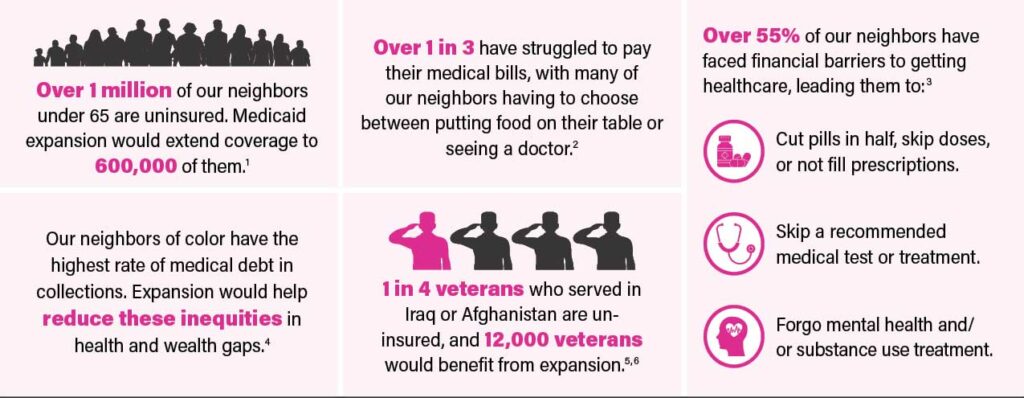Some very exciting news for uninsured North Carolinians has emerged from our State Legislature. This spring, the House and Senate passed the bill that will finally enact Medicaid expansion in North Carolina. This month, the legislative has finally passed a budget that will allow the expansion to move forward in the Tarheel State, and Governor Cooper has announced its launch on December 1, 2023.
Working Families Are the Most Affected
Previously, North Carolina was one of only eleven states without the expansion provisions originally passed as part of the 2010 Affordable Care Act. It’s estimated that over 600,000 North Carolina residents will become eligible for Medicaid benefits through this new agreement. These people fall into the so-called “Medicaid gap,” earning too much income to qualify for standard Medicaid but not enough to qualify for the ACA’s subsidized health insurance. Over 85% of North Carolina’s non-elderly uninsured come from working families. This increased access to health insurance will bring enormous benefits to North Carolinians that need it most.

In the nine years since Medicaid expansion benefits began, a large body of research has emerged highlighting its positive effects. For example, more low-income adults have sought out regular check-ups and necessary medical care because of expanded benefits. In states with the program, estimates show that expanded access to insurance may have saved 19,000 lives between 2014 and 2017. It has also resulted in a $1,140 reduction in medical debt per person who gained coverage under the expansion. This is crucial. Research shows low-income adults with medical debt are much less likely to seek necessary medical care, often allowing life-threatening medical issues to go untreated.
Healthcare Affects More than Physical Health
Beyond health benefits, Medicaid expansion has provided substantial economic benefits to the low-income individuals it serves. With lesser medical debt, individuals covered by expansion had better access to credit including lower interest rates on mortgages, car loans, etc. Consequently, covered adults have saved an average of $280 on annual interest payments. Expanded coverage also reduced eviction judgments and eviction judgment rates, helping prevent people from being pushed into homelessness due to medical emergencies.
At Crisis Assistance Ministry, we see the effects of the lack of access to health care and insurance firsthand, every day. We see hardworking low-income people stuck in high-interest loans due to shattered credit scores from medical debt. We see individuals with severe health issues who are unable to afford the treatment they need. We see families facing eviction or losing power because huge medical bills overwhelm their already tenuous budgets. There are myriad ways the lack of health insurance can cascade and further entrench low-income families into cycles of poverty.

Thanks to the generous support of our community, Crisis Assistance Ministry often steps in to help people in such situations. Our ultimate vision is a Charlotte-Mecklenburg where assistance is no longer necessary because everyone has the resources to weather a financial emergency. But realistically, we know that the need for our services will continue to rise without a strong social safety net and public policy that supports the most vulnerable in our community.
Access to Healthcare Affects the Whole Community
This long-awaited move by North Carolina will provide welcome relief to many low-wage earners who often are not offered health insurance through their employers. Considering the struggles of working families here in Mecklenburg County, there are certainly thousands who will benefit from Medicaid expansion in our own community. Based on evidence from other states, it’s likely all of us will reap the benefits of improved community health, lower eviction rates, and a stronger safety net for our neighbors.
